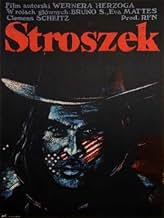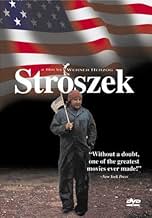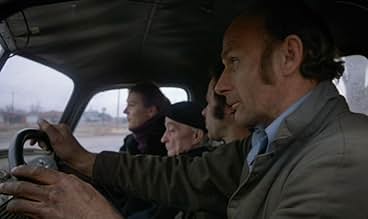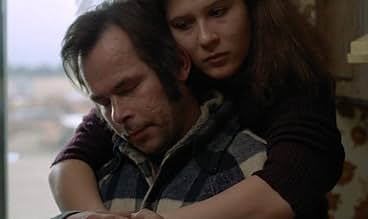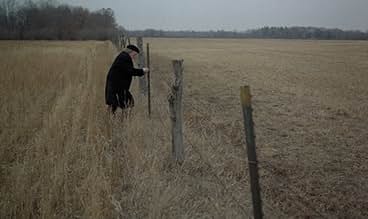En Berlín, un hombre alcohólico que acaba de salir de prisión se une a su anciana amiga y a una prostituta en un sueño decidido de salir de Alemania y buscar una vida mejor en Wisconsin.En Berlín, un hombre alcohólico que acaba de salir de prisión se une a su anciana amiga y a una prostituta en un sueño decidido de salir de Alemania y buscar una vida mejor en Wisconsin.En Berlín, un hombre alcohólico que acaba de salir de prisión se une a su anciana amiga y a una prostituta en un sueño decidido de salir de Alemania y buscar una vida mejor en Wisconsin.
- Dirección
- Guionista
- Elenco
- Premios
- 2 premios ganados y 2 nominaciones en total
- Scott
- (as Scott Mc Kain)
- Doctor
- (as Dr. Vaclav Vojta)
- Turk prisoner
- (as Yücsel Topcugürler)
- Trucker Pimp
- (sin créditos)
- Dirección
- Guionista
- Todo el elenco y el equipo
- Producción, taquilla y más en IMDbPro
Opiniones destacadas
"Stroszek" tells the fictional story of a real man named Bruno Stroszek. In other words, Stroszek plays himself in this eccentric film about a man who's released from prison, meets back up with his girlfriend and elderly buddy, and takes off for the fabled lands of....Wisconsin....to pursue the American dream. Anyone who's actually been to Wisconsin can probably guess how things play out for three immigrants with about three dollars between them. What follows is a series of vignettes that place Bruno in increasingly desperate straits and ends in an ambiguous finale that involves a ski lift and dancing chickens.
Welcome to the world of Werner Herzog, folks. "Stroszek" is not as compelling as some of Herzog's best, but it does inspire a sort of morbid fascination, if only because we take comfort that our situation isn't as bad as the one our characters find themselves in. But lest you are tempted to feel too sorry for Stroszek, he, like many of Herzog's protagonists, staunchly refuses to beg for sympathy, and faces one hardship after another with the dogged determination of a man who never fully understands how humble is his lot.
Grade: A-
A powerful, deeply moving film, 'Stroszek' is unique and unforgettable. It is a tender portrait of life on the margins of society that is most affecting. Herzog's characters are profoundly realistic creations and his story is full of poignancy. A movie about shattered dreams and dashed hopes, its themes are universal and its images captivating. At times, the precisely honed film feels improvisational or off-the-cuff; which is a credit to the unaffected nature of Herzog's writing and direction. Though there is a lot of humor in 'Stroszek,' it is ultimately a harrowing drama that speaks volumes about the human condition within our callous world.
'Stroszek' reunites Herzog with cinematographer Thomas Mauch, one of his more frequent collaborators. Mauch's naturalistic approach gives the film a documentary-like feel, which bolsters the faux-authenticity of Herzog's narrative. His juxtaposition of the constricting alleyways and streets of Berlin with the wide-open spaces of Wisconsin is arresting and effective. In the role of cinematographer, Herzog regularly uses Mauch, Jörg Schmidt-Reitwein or Peter Zeitlinger. The work of the latter two generally feature more stylizations and elaborate lighting, and possess a dream like atmosphere. For a human-centered drama like 'Stroszek,' the realism of Mauch's approach is most appropriate, as the haunting beauty of the resulting visuals prove.
The film boasts an atmospheric soundtrack, featuring songs by the likes of Sonny Terry and Chet Atkins. David Lynch has often stated that a successful film is comprised of "sound and image moving together through time," positing that, in scenes, visuals and sounds must complement each other; as they do masterfully throughout 'Stroszek'. Terry's 'Old Lost John' is utilized particularly well in one scene at the end of the film that sticks in the mind long after the credits have rolled (as it evidently did in Herzog's; he would re-use the song decades later to similar effect in 'Bad Lieutenant: Port of Call New Orleans').
Herzog has said that he doesn't like to "confront" his films alone during the editing stage, and until 1984, Beate Mainka-Jellinghaus assisted him during that process on all his cinematic endeavors. Their work for 'Stroszek' is flawless, and the film has a steady pace that never lets up. Additionally, the set design is muted, though highly detailed. Locations look long lived in, and the grittiness of their appearance adds to the overall narrative impact.
'Stroszek' stars Bruno S as the titular character. Partially inspired by himself, Bruno gives a tour-de-force performance of boundless depth, vulnerability and emotional perspicuity. He is someone you warm to immediately, and has your sympathies throughout. As does Eva Mattes- the only real professional actor involved- co-starring as Eva the prostitute. Her ease of performance and range leaves an indelible impression on the viewer, and you feel she really cares for Bruno. Also worthy of note is Clemens Scheitz's terrific turn as the elderly, comic Herr Scheitz and a troupe of performing chickens; who do most memorable work (despite the intense stupidity of their gaze).
A masterful and understated tragicomedy, 'Stroszek' is vintage Herzog. Boasting an insightful screenplay full of humor and drama in equal measure, the story is heartfelt and speaks of universal human truths. Seamlessly edited and shot with a distinct visual style, the film is timeless and terrific. Strongly acted and featuring an emotive soundtrack full of catchy tunes, this tale of broken dreams is one you'll find hard to forget.
The running commentary that Herzog has recorded for the recent DVDs of his films are among the most interesting and engaging I've heard, and they're one of the reasons I especially appreciate the DVD medium. That's not to say that he lets the literal-minded viewer off the hook by providing handy explanations for every peculiar image or bit of dialog. When asked what a certain image or phrase signifies, he will sometimes simply say that he cannot explain it. But I find it fascinating to watch a scene, and then scan back and listen to his comments about the location, actors, technical details, and yes, even sometimes the intended effect of a puzzling image. Many of the people seen in his films are non-actors, people he simply ran into, found interesting, and intuitively knew would be effective on film. Some of the players in Herzog's films are the very people that most directors would chase from their set with security guards, but he sees something interesting in them, and finds a way to tap into it. I can't help liking the man for that. Some people have suggested that his use of the unfortunate Bruno S. as a film actor amounted to some sort of exploitation. But it seems to me that his befriending of Bruno, and his artful and patient use of him as a film actor, must have given Bruno some sense of the dignity and worth as a unique human being that was denied him for most of his life. If this means nothing to you, and you don't know anything about Bruno S., the commentary tracks on either "Stroszek" or "The Enigma of Kaspar Hauser" explain his background nicely. It's a remarkable story.
If you're unfamiliar with Herzog's work, he has done some especially exotic films with the volatile actor Klaus Kinski. "Cobra Verde" is a particular favorite of mine. But his films do not have the relentless pace or hyperactive editing typical of mainstream American films. They are unforgiving of those with short attention-spans, so be forewarned.
This intensely moving and satisfying film which begins in Germany and winds up in Wisconsin is solid through and through. There's not a weak moment or weak element to be found. The acting, especially by Bruno S., is completely unaffected and without over-stylization (there is, perhaps, a reason for this - they aren't acting, simply being). The story itself deals with melodramatic elements without steering into soap opera territory and the film's ideology is not black in white. There's subtlety and complexity to the ideas put forth in this film about America, Germany, human beings, life, etc. Moreover, Stroszek avoids beating the audience's brains with its ideas; Herzog presents them in the context of the story, smoothly integrated.
And then there's the beautiful photography, particularly of the American Midwest; Herzog and his cameramen capture perfectly the cold, stark, desolate magnificence of the upper-Plains. To draw a weird comparison, the photography here is the equivalent of Husker Du's New Day Rising - crisp, harsh, and gorgeous simultaneously.
Stroszek also has a justifiably well-known ending, both surreal and completely sensible. Though any other director would be unable to top an ending such as that in Aguirre (the slumped conqueror, floating on a monkey-covered raft), Herzog does just that here.
Truly, if you have not seen any Herzog, this is a great place to start; then go see Aguirre, Fitzcarraldo, Nosferatu, Woyczek, and Invincible. The man is brilliant and I await with bated breath Grizzly Man, his new project.
There are certain messages in this film, and a probably important one is that it's hard to run away from trouble. Moving to a new city, or country in this case, doesn't always do it. When the prostitute leaves Stroszek for Vancouver, leaving him with a mortgage and no income, you know he's screwed. Beyond these elements, Stroszek is a movie with character but is not altogether impressive. Bruno Stroszek is interesting, but not as extraordinary as Kaspar Hauser. Ultimately, it leaves me a little underwhelmed.
¿Sabías que…?
- TriviaThe entire crew disliked the last sequence so much that director Werner Herzog had to shoot it by himself. Incidentally, he considers this scene the best he has filmed.
- ErroresAfter Bruno, Eva and Scheitz buy a used car, they drive out to Wisconsin. The camera's shadow is visible on the car as Eva drives.
- Citas
[last lines]
Deputy Sheriff: We have a 10-80 out here, a truck on fire, we have a man on the lift. We are unable to find the switch to turn the lift off, can't stop the dancing chickens. Send an electrician, we're standing by.
- ConexionesFeatured in Century of Cinema: Die Nacht der Regisseure (1995)
- Bandas sonorasOn the Way Down to Phoenix
Written and Performed by Chet Atkins
Selecciones populares
- How long is Stroszek?Con tecnología de Alexa
Detalles
- Fecha de lanzamiento
- País de origen
- Idiomas
- También se conoce como
- La balada de Bruno S
- Locaciones de filmación
- Plainfield, Wisconsin, Estados Unidos(hold up on North Street)
- Productoras
- Ver más créditos de la compañía en IMDbPro
Taquilla
- Total a nivel mundial
- USD 3,451
Contribuir a esta página


